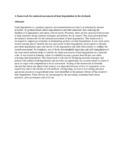/ library resources
Showing items 1 through 8 of 8.Land degradation is a gradual, negative environmental process that is accelerated by human activities. Its gradual nature allows degradation to
proceed unnoticed, thus reducing the likelihood of appropriate and timely control action. Presently, there are few practical frameworks to help
Land governance and administration are critical for achieving economic growth and development in any country.
Agriculture remains a major source of income for more than 80 per cent of the rural population in Lesotho, although the country's arable land is only about nine per cent of the total land area.
The Climate Action Tracker (CAT) compares and assesses national and global action against a range of different climate targets across all relevant time frames.
Market solutions based on the trade of carbon offset credits remain a dominant feature in international climate change negotiations.
The report considers the critical issues providing the context for discussing land issues affecting West Africa as a region.
Examines 3 case studies of proposed biofuel developments in Mozambique and Sierra Leone in terms of social displacement. More mitigation measures could provide livelihood restitution and avoid negative food security impacts.
Land managers increasingly need to collect, store, and analyze monitoring and assessment datasets that include multiple methods and occur over multiple years.
Land Library Search
Through our robust search engine, you can search for any item of the over 73,000 highly curated resources in the Land Library.
If you would like to find an overview of what is possible, feel free to peruse the Search Guide.





